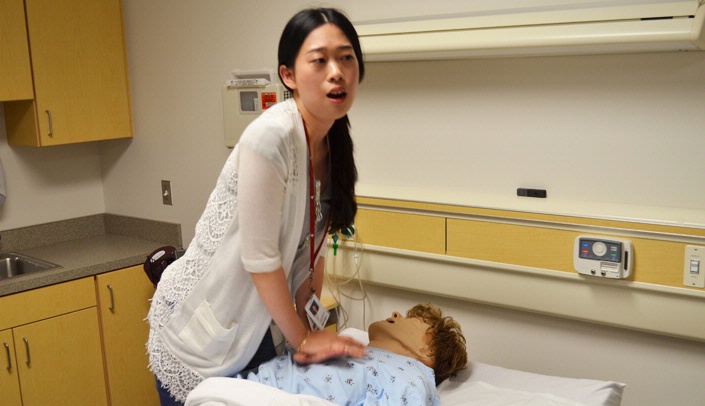The patient is coding.
One health professional is straddling his chest, doing compressions. Another is preparing the crash cart. A third is dealing with the patient’s daughter, who is strident and afraid.
And Jeffrey Harrison, M.D., is watching with a tiny smile.
Dr. Harrison is the host of UNMC’s U.S.-Sino Family Medicine Leadership Course, in which a group of family medicine practitioners and medical residents from Shanghai, Xi’an and Beijing, China, have come to UNMC to learn advanced U.S. training techniques and models, such as how to use simulation. China has a weak primary care infrastructure, so it has identified expanding and strengthening its family medicine physician pool as a priority for improving health care delivery.
“A lot of our family medicine physicians, residents and teachers want to come here to learn,” said Shanzhu Zhu, Ph.D., the dean of the general practice department, Shanghai Medical College, Fudan University. Dr. Zhu, who also is the president of the Chinese Society of Family Medicine, is joined by a group of 16 family medicine physicians, professors and residents. “The U.S. has the gold standard for training, and at UNMC, family medicine ranks very highly. We’re learning from the gold standard.”
Dr. Zhu is a recognized leader in family medicine education and training in China. She shared the field’s successes and challenges in a campus lecture on June 17.
It’s the fourth year for the program, and Dr. Harrison already can see an evolution in the visitors’ level of understanding of family medicine in the U.S. and how what they learn can be applied in China.
“Every year, the group comes in a little more advanced than the year before, so Shanghai has actually made very good progress in getting their family medicine going,” he said. “When we did this in year one, there wasn’t a lot of insight and understanding into what we were trying to teach. This group comes in at a much more advanced level.”
The program teaches team-based care, interviewing skills, strategies for dealing with angry patients and how UNMC faculty gives feedback and evaluates learners.
“They’ve participated in our palliative care symposium,” Dr. Harrison said. “We have them going out to work in our clinics and with our faculty to see how we deliver care and how we teach our learners. It’s fairly comprehensive and we try to cover a lot of topics.”
